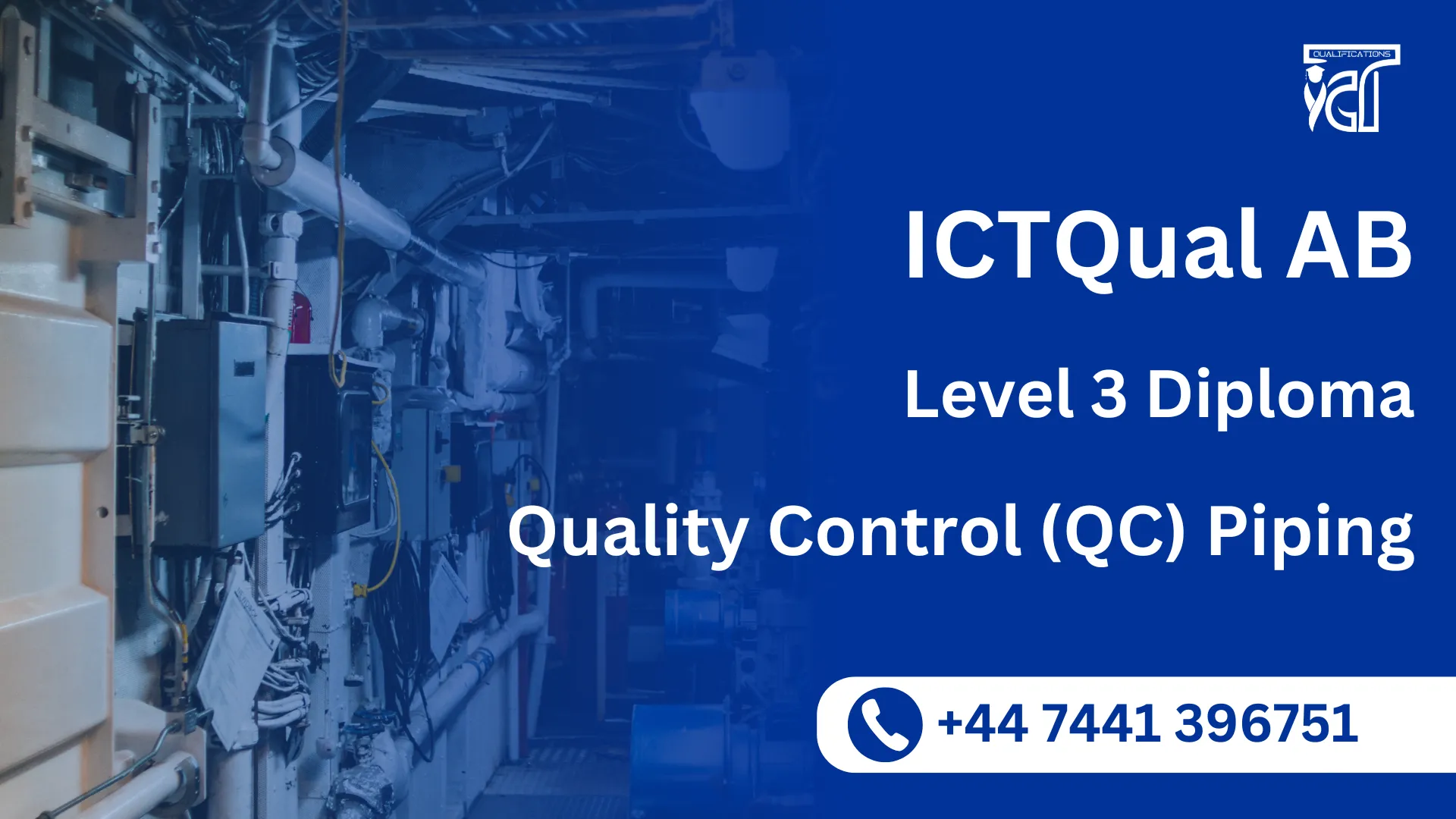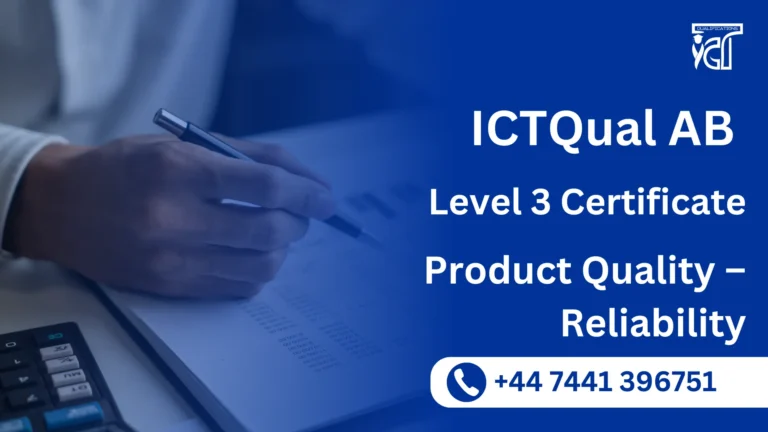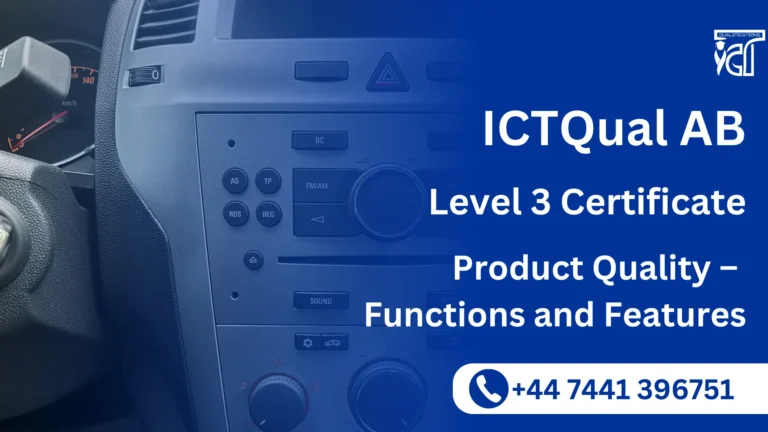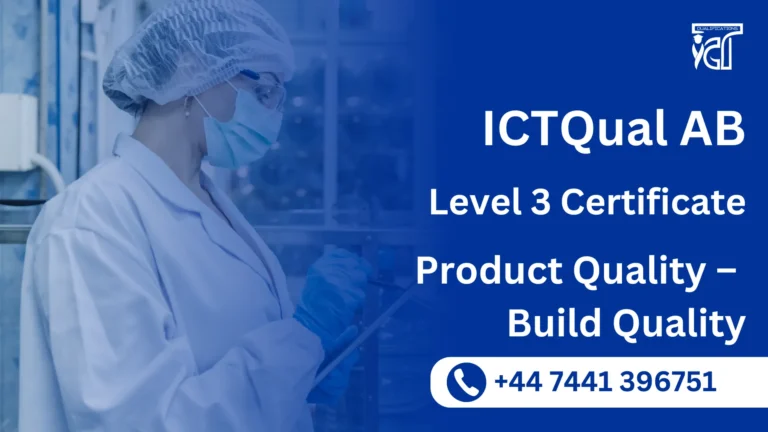The ICTQual AB Level 3 Diploma in Quality Control (QC) Piping is designed as a foundation qualification for learners who are beginning their journey in piping inspection and quality assurance. This program introduces the core principles of piping systems, fabrication processes, and compliance practices, making it an ideal starting point for individuals with little or no prior technical background.
Learners will gain awareness of piping materials, basic welding procedures, and introductory inspection techniques, while also being introduced to international standards such as ASME, API, and ISO. The course emphasizes practical understanding, enabling participants to recognize common defects, support inspection activities, and contribute to safe and reliable piping operations.
By combining theoretical knowledge with practical exercises and documentation practices, the diploma builds confidence and technical awareness. It prepares learners to assist in QA/QC teams, understand compliance requirements, and develop the skills necessary for entry‑level roles in industrial projects.
Ultimately, the ICTQual AB Level 3 Diploma in Quality Control (QC) Piping provides a strong platform for progression. It opens pathways to higher‑level diplomas, specialized certifications, and career opportunities in industries such as oil, gas, petrochemicals, construction, and manufacturing.
ICTQual AB Level 3 Diploma in Quality Control (QC) Piping
This qualification, the ICTQual AB Level 3 Diploma in Quality Control (QC) Piping, consists of 6 mandatory units.
| Sr# | Unit Title |
| 1 | Advanced Welding Inspection for Piping Systems |
| 2 | Non-Destructive Testing (NDT) Techniques |
| 3 | Pressure Testing and Leak Detection Methods |
| 4 | Review of International Piping Standards (ASME, API, etc.) |
| 5 | Documentation and Reporting in QC Processes |
| 6 | Root Cause Analysis in QC Failures |
Learning Outcomes for the Study Units:
1. Advanced Welding Inspection for Piping Systems
By the end of this unit, learners will be able to:
- Perform detailed inspections of weld joints using advanced tools and techniques.
- Identify critical welding defects and assess their impact on system integrity.
- Verify compliance with Welding Procedure Specifications (WPS) and welder qualifications.
2. Non-Destructive Testing (NDT) Techniques
By the end of this unit, learners will be able to:
- Understand the principles and applications of common NDT methods including UT, RT, MT, and PT.
- Select appropriate NDT techniques based on material type and inspection objective.
- Interpret NDT reports and identify indications requiring further evaluation or corrective action.
3. Pressure Testing and Leak Detection Methods
By the end of this unit, learners will be able to:
- Conduct hydrostatic and pneumatic pressure tests in accordance with safety procedures.
- Identify and analyse leaks using approved detection methods.
- Evaluate pressure test results and document acceptance or rejection criteria.
4. Review of International Piping Standards (ASME, API, etc.)
By the end of this unit, learners will be able to:
- Interpret key sections of international piping codes such as ASME B31.3, API 570, and others.
- Apply code requirements to inspection, fabrication, and testing procedures.
- Stay updated with standard revisions and assess their impact on quality control practices.
5. Documentation and Reporting in QC Processes
By the end of this unit, learners will be able to:
- Compile and review inspection test plans (ITPs), material test certificates (MTCs), and weld maps.
- Prepare accurate inspection reports and non-conformance records.
- Maintain complete and traceable quality documentation for audits and project records.
6. Root Cause Analysis in QC Failures
By the end of this unit, learners will be able to:
- Investigate quality control failures using structured root cause analysis methods (e.g. 5 Whys, Fishbone Diagram).
- Identify contributing factors and develop corrective and preventive action plans (CAPA).
- Collaborate with teams to implement long-term quality improvements.
The ICTQual AB Level 3 Diploma in Quality Control (QC) Piping is designed as a foundation program for learners who are new to piping inspection and quality assurance. It provides essential knowledge of piping systems, fabrication processes, and compliance practices, making it an ideal starting point for beginners.
Technical Competence
- Basic understanding of piping materials and fabrication processes
- Introduction to welding inspection and procedure awareness
- Awareness of international codes and standards such as ASME, API, and ISO
- Familiarity with basic inspection techniques for piping systems
- Development of documentation and reporting skills for compliance
Professional Growth
- Entry into QA/QC and piping inspection roles at trainee or assistant level
- Recognition through an internationally benchmarked qualification
- Foundation for progression to Level 4 and higher diplomas in QA/QC
- Improved employability in industries such as oil, gas, petrochemicals, and construction
- Opportunity to build a career pathway in piping and quality assurance
Industry Relevance
- Alignment with industry practices in piping and fabrication projects
- Contribution to safety and reliability in industrial operations
- Exposure to case studies and practical scenarios for applied learning
- Ability to support audits, inspections, and compliance reporting
Personal Development
- Confidence to begin a career in quality control and piping inspection
- Analytical thinking for identifying defects and supporting corrective actions
- Commitment to safety, compliance, and ethical responsibility
- Adaptability to diverse industrial environments
- Motivation to pursue higher qualifications and continuous learning
The ICTQual AB Level 3 Diploma in Quality Control (QC) Piping is designed for learners who are at the very beginning of their journey into piping inspection and QA/QC. The ideal learner is someone motivated to gain basic knowledge of piping systems, fabrication processes, and compliance practices, with a clear interest in progressing toward higher‑level diplomas.
Technical Background
- Beginners with little or no prior industry experience
- School leavers or early‑career participants seeking entry into piping QA/QC
- Learners with a basic understanding of science subjects (physics, materials, or general technical awareness)
- Individuals curious about piping systems and fabrication processes
- Candidates eager to explore international standards such as ASME, API, and ISO
Career Aspirations
- Learners aiming to enter QA/QC roles at trainee or assistant level
- Individuals seeking recognition through an internationally benchmarked qualification
- Candidates preparing for progression to the ICTQual AB Level 4 Diploma in QC Piping
- Participants motivated to build a career pathway in piping inspection and quality assurance
- Early‑career learners seeking employability in oil, gas, petrochemical, and construction sectors
Personal Qualities
- Curiosity and willingness to learn technical subjects
- Attention to detail in inspection and documentation tasks
- Commitment to safety, compliance, and ethical responsibility
- Adaptability to diverse industrial environments
- Motivation to pursue higher qualifications
Completing the ICTQual AB Level 3 Diploma in Quality Control (QC) Piping provides learners with the essential foundation to advance academically and professionally. This qualification serves as the first step into piping inspection and QA/QC, opening pathways to higher diplomas, specialized certifications, and industry roles.
Academic Progression
- Progression to ICTQual AB Level 4 Diploma in Quality Control (QC) Piping)
- Eligibility for advanced diplomas in piping engineering, welding inspection, or industrial QA/QC
- Opportunity to pursue specialized certifications such as ASME, API, ISO, and NDT Level II
- Preparation for structured learning routes in project quality management and industrial safety
- Foundation for higher‑level studies in inspection and quality assurance disciplines
Career Progression
- Entry into trainee QA/QC roles in piping, welding, and fabrication projects
- Opportunities to work as piping assistants or inspection trainees in oil, gas, and petrochemical sectors
- Employability in construction, manufacturing, and power generation industries
- Foundation for supervisory responsibilities after progression to higher diplomas and gaining industry experience
- Increased career mobility through an internationally benchmarked qualification
Professional Development
- Recognition as a qualified learner with industry‑relevant skills
- Ability to support audits, inspections, and compliance activities
- Development of technical confidence for real‑world industrial projects
- Access to continuous professional development programs and industry workshops
Entry Requirements
Learners must meet the following criteria to be considered for admission into the course:
- Age Requirement: Minimum age of 18 years or above
- Educational Background: Completion of secondary school education or equivalent. No prior technical qualifications are required, though a basic understanding of science subjects (such as physics or materials) is helpful
- Work Experience: No industry experience is required. The course is suitable for beginners, school leavers, or those starting their journey in piping inspection and QA/QC
- English Language Proficiency: Basic ability in spoken and written English is required, as the program is delivered in English. International learners may be asked to demonstrate proficiency at CEFR A2 level or equivalent
Register Now
Qualification Process
Qualification Process for the ICTQual AB Level 3 Diploma in Quality Control (QC) Piping
- Self-Assessment:
Begin by evaluating your eligibility to ensure you meet the qualification requirements, including work experience, knowledge, and language proficiency. - Registration:
Complete your registration by submitting the required documents, including a scanned copy of a valid ID, and paying the registration fee. - Induction:
An assessor will conduct an induction to confirm your eligibility for the course and explain the evidence requirements. If you do not meet the criteria, your registration will be cancelled, and the fee will be refunded. - Assignments & Evidence Submission:
Provide all assignments and the necessary evidence based on the assessment criteria outlined in the course. If you are unsure of the required evidence, consult with the assessor for guidance on the type and nature of evidence needed. - Feedback and Revision:
The assessor will review your submitted evidence and provide feedback. Evidence that meets the criteria will be marked as “Criteria Met,” while any gaps will be identified. You will be asked to revise and resubmit if needed. - Competence Evidence:
Submit final evidence demonstrating that all learning outcomes have been met. This evidence will be marked as “Criteria Met” by the assessor once it is satisfactory. - Internal Quality Assurance (IQA):
The Internal Quality Assurance Verifier (IQA) will review your evidence to ensure consistency, quality, and compliance with standards. - External Verification:
The IQA will submit your portfolio to ICTQUAL AB External Quality Assurance Verifiers (EQA) for final confirmation. The EQA may contact you directly to verify the authenticity of your evidence. - Certification:
Upon successful completion of all checks, ICTQUAL AB will issue your official certificate, confirming that you have attained the ICTQual AB Level 3 Diploma in Quality Control (QC) Piping







